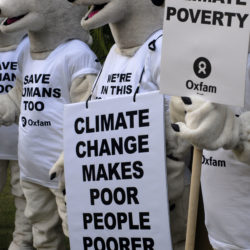
The Double Threat of Climate Change and Poverty

The recently released UN climate change report contains an incredibly catastrophic but equally important message: we are on the brink of climate disaster if we don’t act.
Already societies are feeling the effects. Former food-lush wonderlands like the Comoros are seeing their food production shrink due to decrease rainfall, soil erosion and deforestation and 94.9 million people now rely on humanitarian aid to feed themselves.
Climate change and poverty are evils that are linked in many ways and the cruel reality is climate change is making the quest to end poverty much more challenging. The poorest people in the world are living in areas feeling the direct effects of climate change. Floods, drought and extreme temperatures are reducing their ability to grow food and even live.
What can we do? That’s what we’ll look at this week.
One of the major symptoms of climate change that is being felt by those in poverty is food insecurity. Considering 75% of people living in poverty rely on agriculture to survive and the new extreme weather patterns will dramatically alter our ability to grow food, and these reduced yields will result in an increase in prices, the increasing food insecurity is going to be felt the most in areas that already suffer from poverty and hunger pains.
Solutions are being sought out. In Vietnam, for example, mutation breeding is being used to produce rice that can survive in the new climate. This new strain is proving to withstand extreme weather and is resulting in increased harvests in less time. Although the act of altering a species (through radiation or chemicals) may seem unnerving the positive effects of this practice are a clear indication of its needed role in modern farming.
In Uganda, introducing mutation breeding also saw positive results, with agricultural income growing by 16%.
These innovations are important for communities currently facing foo insecurity and will be important for the greater world as climate change increases its hold on the world.
Water may be the planet’s most valuable asset and is also one that is very much at risk. Already 844 million people lack access to clean water and 1 in 3 don’t have clean water close to home. Here in Canada we hold 20% of the world’s freshwater and the majority of the population have good access to clean, safe water when we need it. Sadly this is not true the world over (or even the whole country) and those living in poverty are the ones suffering the most from water crises.
The good news is we recognize the responsibility that comes with access to that water and are working to ensure that the future of water management is bright and will continue providing humanity with clean drinking water.
Waterlution is at the forefront of this movement, working across the globe to raise awareness on water conservation and the importance of collaboration and water management systems. Headquartered in Oakville, the initiative has water innovation labs in Australia, Brazil, Europe and India and is using these to engage people into becoming water leaders and work on solving the water crisis before it’s too late.
We need these innovative thinkers. Access to clean water should be seen as a human right and the fact that millions are currently deprived of this right is nothing less than a disgrace. Our fight against climate change must be ready to vanquish this growing issue or all is lost and—like with so much concerning climate change—the ones suffering the most are the ones who did the least to cause the problem.
As climate change continues its rampage the natural disasters will increase in number and scope—and the poor are the ones that will suffer the most. One, because they live in danger zones that are more susceptible to extreme weather and two, because they don’t have the (financial) resources to recover from these disasters.
This is a good example of the massive injustice that exists in our world.
This is why it is important to support groups like Mercy Corps. Founded as a way to help combat poverty the group has now helped millions of people recover from catastrophes like earthquakes, famines and hurricanes. By working with recovering communities and helping them gain access to clean water and agriculture Mercy Corps is doing its part to minimize the damage brought on by the effects of climate change.
We can’t solve climate change or poverty overnight but we should be doing everything in our power to limit the damage and help those who are caught in the crosshairs.
The effects of climate change and poverty on their own are devastating and the fact that people are having to deal with both is heartbreaking. We need to limit the damage we are causing to the earth but we also need to make sure the people bearing the brunt of the effects aren’t left ignored and abandoned.
Neither climate change nor poverty are problems that can be swept under the rug and left for later generations to solve. Let’s work to make sure neither problem reaches the point of no return.

